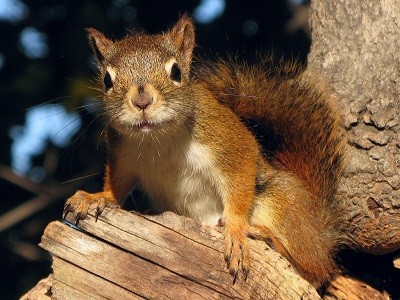
 Is having early birth months an advantage for animals, as well as humans? There are benefits to being older and wiser, it seems, especially for red squirrels.
Is having early birth months an advantage for animals, as well as humans? There are benefits to being older and wiser, it seems, especially for red squirrels.
Researchers from the University of Guelph have concluded that squirrels from litters born earlier in the year have a higher survival rate than those born later, since they’re more likely to leave the nest earlier and find a territory to claim as their own.
Part of the larger Kluane Red Squirrel Project, the study tracked over 2,500 red squirrels in the Yukon and found that a squirrel’s chances of making it through the winter were improved by growing faster and being born earlier.
Early birth months a “key factor for survival…”
“We found being born earlier than the other litters in your neighbourhood was a key factor in survival,” said David Fisher of the Department for Integrative Biology at the University of Guelph and co-author of the new study, in a statement. “This is because if you are born before your neighbours, you can leave your nest first and find a vacant spot to store your food for the winter.”
Baby red squirrels are born between March and May and can spend about two months in the nest before venturing out to claim their territory, sometimes a daunting task when nearby real estate is already occupied. Typically, juvenile red squirrels move an average of 90 metres from their birth spot in order to find new space to claim, which they mark with their own cache of spruce cones.
Some species of squirrels such as the northern flying squirrel and the American red squirrel are very territorial while others like the common grey squirrel and the fox squirrel are not. The chasing behaviour we’ve all witnessed, where the little creatures frantically chase each other up and down tree trunks and across parks, screeching and chattering all the while, is often just as one would think: a dispute over territory. Other times, it’s a display of dominance in aid of establishing a hierarchy.
The new results are a rare example in nature of what is known as multilevel selection, where inherited traits expressed at the group level (such as a herd, neighbourhood group or flock) can impact the success of particular individuals. In this case, being early-to-rise, which is an inherited trait for red squirrels, leads to higher survival rates yet apparently does not result in earlier and earlier births — an instance of evolutionary stasis, say the study’s authors.
“Higher population densities increased the strength of selection for earlier breeding, but did not influence selection on growth rates,” say the authors, whose research is published in the journal Evolution. “Females experienced especially strong selection on growth rate at the within-litter level, possibly linked to the biased bequeathal of the maternal territory to daughters.”
In a review of the new study, James Marvel-Coen of the University of Chicago praised the results, saying they show how natural selection for life-history traits can occur at different levels within a species.
“The accumulation of potential examples of multilevel selection in natural populations should provide greater understanding of this potentially important phenomenon,” writes Marvel-Coen.
Leave a Reply
You must be logged in to post a comment.



 Share
Share Tweet
Tweet Share
Share




Comment